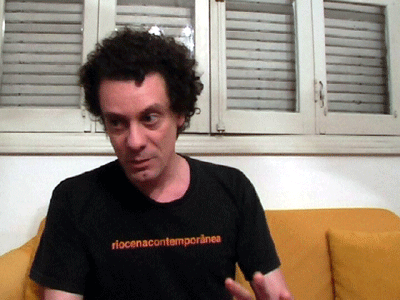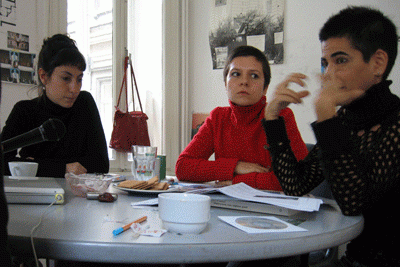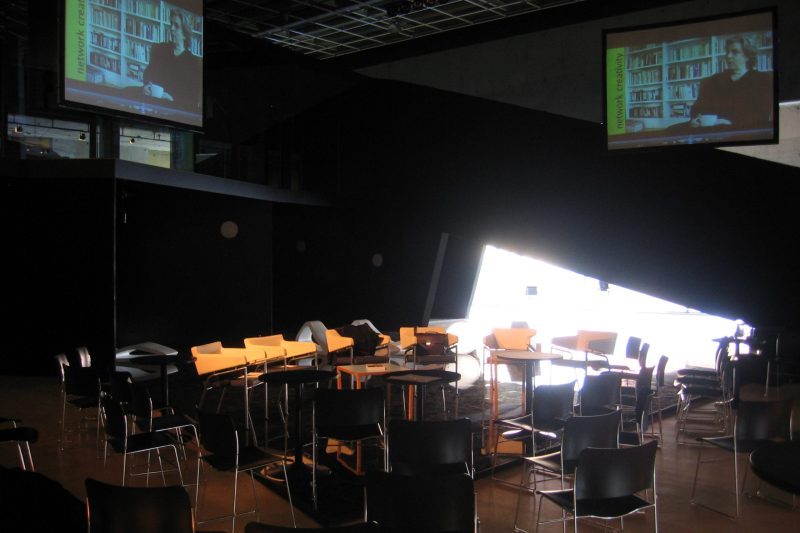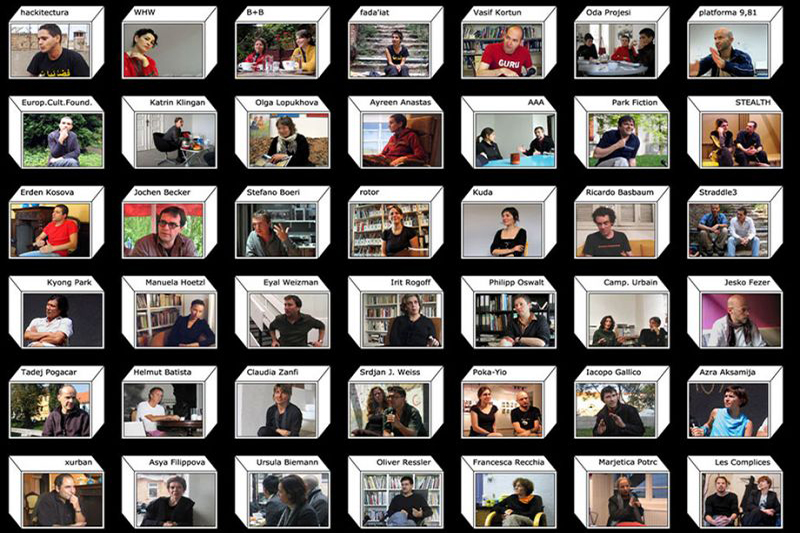- Interview
- Rio de Janeiro
- 2005
- NETWORKED CULTURES
CONVERSATION WITH RICARDO BASBAUM
PM/HM: Travel, role-play, transformation – there’s a certain line of displacements to be found in your work. What role do such displacements play in the way you produce art?
Ricardo Basbaum: Artists should not control meanings, and how people play, project and imagine things in relation to their work. These things should remain open. It’s interesting for artists to discover that they don’t exist prior to their works, but are reinvented each time anew. Many thinkers have expressed such thoughts. Most obviously, Deleuze and Guattari, to whom I feel particularly close. They often talk about such matters. The subject comes after the rest; it’s not what’s in the foreground.
For an artist this is really the playful part of artworks. If you think you know who you are and constantly take it for granted, you’ll simply ruin your work. You need to go behind things, because it’s all a game. I think one of the most interesting things for an artist is to let himself/herself be reinvented in some way and be carried away by the work he/she is doing. Though this has limits. It isn’t that you’re reborn each time, but that you’re able to play and there are spaces with which you can play. If you’re aware of this, you can incorporate it into how you work as an artist.
So that’s what I like and try to work with. I work with roles, though this doesn’t just have to do with the roles of the artist, critic or curator, but also with my thinking and how I depart from different ways of creating these roles. Apropos the image of the artist, what kind of artist do you want to be? Do you want to be at the top of the market? Some artists want this extremely badly. It’s true, this is a possible position for an artist. You can play with fashion, you can play with marginality, you can play with suffering and the role of the romantic artist. In art history, there’s also this game with the image of the artist – and it can be traced.
So I have been playing more or less with these different roles (artist, agent, critic, curator) and with the image of the artist I would like to negotiate. In these roles I include a certain subjective component. Not that I’m completely conscious of this but it is, to an extent, an aspect that interests me.
PM/HM: Politically and socially engaged art is often conceptualised in relation to working with selected groups or communities. In what you describe, you seem to mistrust direct involvement in political situations and prefer a more playful negotiation of power. What kinds of politics and aesthetics emerge from this interaction?
Ricardo Basbaum: You can play with the political in different ways and not necessarily only as an artist. I really don’t know what’s the most effective way of playing with politics. Is it by being an artist or an anthropologist or a civilian? Of course you can play with art in politics as well. I think my work deals with politics, but I’m sometimes uncomfortable with the fact. When you go into the political arena it’s very difficult to re-invent yourself. The subjectivity of politics seems to be already prepared for you. It targets a ready-made person, the political person. It’s really difficult to invent different subjectivities in a political role.
That’s why I think it’s tricky and difficult to play with politics – though obviously, it’s also very necessary. When you do so with art you really need to think a lot about how you play. So I think artists who play with politics really need to invent a way of positioning themselves in order to avoid the commonplaceness of the political person who has all sorts of sentences, all sorts of ready-made answers. I’m not speaking about content, but about how things are dealt with. Maybe because of my Brazilian heritage, art can’t avoid being a fusion of sensory elements. If you try to avoid this, and just concentrate on content and statements, you lose a lot. Then it would be better to choose another route, not art.
PM/HM: Sometimes we feel that the major hope of the twenty-first century lies in the potential of different cultures to interact in an undauntedly creative manner. This is usually linked to the idea that, because of the differences between cultures, they constantly reinvent themselves to engage with one another meaningfully. Do you see any relevance in such optimistic or utopian thinking?
Ricardo Basbaum: It’s complex. As someone who grew up in the 1980s I don’t know to what extent a utopia is a productive thing. I don’t believe in magical solutions. It’s such a slow process. It’s always about negotiating and moving through empty spaces. When I speak about Brazilian culture it’s very clear to me that I have to specify what I’m referring to. When I say Brazilian culture, I don’t mean official Brazilian culture, because I don’t really care about or believe in it. I think the main parts of any culture aren’t the official ones. So it’s difficult today to believe in a big totality. It’s always about small groups. Although small for a city is one thing; small for a country, another; and small for the world, a lot. It’s really difficult, it takes time and has its own dynamics. Nevertheless, I think there are certain links that certain people just spread and create. And they can very slowly contaminate others. I believe this group of millions worldwide has a different speed, and they’re aware of something others don’t care about. And this is something I’d like to believe. Though it’s not the totality of everybody who is interested. And I don’t mean there’ll be a kind of redemption – I don’t think that will ever happen.
Anyway, it’s always a game. A game played by certain groups that don’t fit in completely or are more aware or caring. Not that these people are illuminated or special. It’s just a kind of incitement that’s interesting to cultivate and not everybody experiences the same incitement at the same time. I believe strongly in such dynamics.
There’s this art critic who was active during the 1950s, 60s and 70s: Mario Pedrosa. He died in 1981. He was a very important person for Brazilian art. He was extremely active against fascism and went to Europe in the 1930s and 40s. He made a very interesting and fitting comment about how Brazil is condemned to be modern. It’s as if we have to make revolution over and over again.
We don’t have a background based on tradition, so horizons are open to invention. This means you can always try to create some sort of utopia. We don’t have centres and models; we can always still plan what might be next, because we are never already something.
This is all very interesting, but this utopian element also scares me. Though I actually believe a utopia can serve a good role when you’re stuck and can’t move. For then a utopia can generate movement. Nevertheless, I think today it’s more important to be somewhat pragmatic, to cultivate certain kinds of conflicts or negotiate a great deal. You know you play a double role – sometimes inside and sometimes outside. But it’s necessary to do both. I think it’s much more important to learn how to play with such movement and not be stuck just in one place or, if you have to negotiate with larger powers, to be able to escape somehow, too. It’s very difficult to play with such displacements.
PM/HM: Notions of playfulness and reinvention are also important in your long-term project: Would you like to participate in an artistic experience? After showing at the documenta12 in Kassel, how is this project to evolve in the future?
Ricardo Basbaum: This project consists of an object that I let people use as they wish for a month. They can do whatever they want with it, all they have to do is send me some kind of documentation. The project has been going on for thirteen years (since 1994) and now it’s entering its third stage. It can virtually go on forever – for instance, for the next two hundred years – because it’s based on a mechanically produced object.
I’m still learning from the project, because even though it has been going on for thirteen years, I haven’t worked on it properly yet. I’ve archived the documentations, I have set up a website and now I’m preparing myself for this next stage.
At the same time, my experiences with it are very complex in terms of notions of conceptual art or theories of contemporary art; though it can also be regarded as just a very direct, painted steel object. And a very useful item: you can use it in your kitchen, your toilette or to bathe the baby. So it has both the role of being useful and of being a conceptual piece at the same time. Though so far it hasn’t been used to its full potential. What’s more, I would like to take the project to different cultures and play with different groups. Sometimes an artist is only able to play with the art world. However, I would also like to gain access to other worlds I haven’t reached yet.

Ricardo Basbaum
is an artist and writer who was born in 1961 and currently lives and works in Rio de Janeiro, Brazil. Recent solo shows include ‘la société du spectacle (& NBP)’ (kunstraum lakeside, Klagenfurt, 2007) and ‘psiu-ei-oi-olá-não’ (A Gentil Carioca, Rio de Janeiro, 2004). In 2007 Basbaum exhibited at Documenta 12 (Kassel) and presented work at ‘Imagine Action’ (Lisson Gallery, London), among other group shows and projects. In 2006 he co-curated ‘On Difference #2’ (Kunstverein Stuttgart) and ‘pogovarjanja/conversations/conversas’ (with Bojana Piskur, Škuc Gallery, Ljubljana). He is the author of Além da pureza visual (Zouk, 2007) and a contributor to Art after Conceptual Art (ed. Alexander Alberro and Sabeth Buchmann, Generali Foundation, MIT Press, 2006). He works at the Instituto de Artes, Universidade do Estado do Rio de Janeiro.


